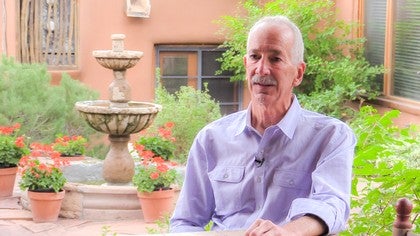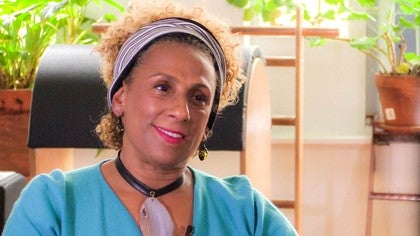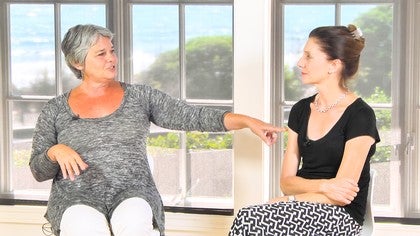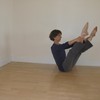Description
About This Video
Transcript
Read Full Transcript
My name is Rob Feldman. I'm a, uh, physician in the community and I met EUV Gentry, um, early on in living here about 30 years ago, I had, um, injured my back trying on cowboy boots and, uh, the salespersons told me that you had to pop into them for them to fit properly. So I'm tugging on these cowboy boots and there was a pop. It was my back. And, um, I really had a hard time after that with my back and I was trying all sorts of different things and, uh, somebody suggested Eve Gentry. I didn't know anything about her, but, uh, something about that suggestion appealed to me and I went and met her as a patient. One of the things I remember is it wasn't just all about doing exercise.
It was sort of about educating her client about why the, why she did what she did and what the genealogy of of that was in terms of where she learned what she knows or knew. Um, so I think she was very appealing, not just as a therapist, but as an educator. She taught me things that I still do. To this day, one of the things I remember is, um, you know, this better than I know this, but lying on my back, uh, just on the floor and lifting my torso up and then coming down very slowly so you could feed, feel each T roll spinus process touching, and then the next one, then the next one, then the next one, and then the next one. And I, I still do that exercise. I think about the way she told me to do it. The other thing she always emphasized was doing whatever I was doing slowly in the way of exercises. So, you know, I'm a surgeon, so I was always rushing around in my life and learning to do things physical slowly was just not my, you know, habit. I always did things quickly.
So I remember that was always an issue with hers. Slow it down, slow it down, slow it down. And I've tried to apply that as well. I began shortly after getting to know her, to start referring patients to her. And, um, it was, it was different 30 years ago. Referring patients was a fairly casual thing, you know, I'd write a note on a slip of paper and give it to the patient. The patient would make an appointment and that was it. And over the years things have become much more complicated.
You have to justify referring patients to sources for therapy. The sources for therapy have to be credentialed to do what the doctor is asking them to do. So it, at the time when I first met her, it was actually very easy to refer patients to her. She was a little bit alternative even then, uh, she, I went to her house in a kind of a little porch who was down underneath the garage, if I remember correctly. And she had some equipment, but the equipment didn't seem to be a big thing, but it was a little bit funky. And so I would sort of either prepare patients for what they were gonna be getting into, uh, or picking some patients, um, as good candidates and others as people who would probably not be comfortable with that environment. My principal responsibilities as surgeon is to screen patients to make sure they do or don't need surgery. It goes both ways, uh, and um, if they didn't need surgery, um, I made it a habit to try to find what are the other resources that were available to them in the community that would help them with their problems short of doing surgery. And, um, so physical therapy was always a, uh, physical therapy and politesse were, uh, co equals at the top of my list for alternative care other than surgery for a lot of the things that my patients were coming to me with. Now. Uh, the, the, the types of things would be a whiplash injury from an auto accident where I had already determined there was nothing broken, there was no spinal injury.
They simply needed to be help, help in a more healing environment than just letting them get better on their own. Um, there would be people try to Gillian things already, you know, aspirin, Tylenol, anti-inflammatories, narcotic pain, medications, shots and injections of cortisone, um, even surgeries and they're still not happy and doing well what they're doing in those, that group of patients also would be patients that might benefit from somebody like Eve and by Platas training. But it was great to have as a resource that I, that I felt safe about. And you mentioned earlier in our discussion about safety and I, I always felt safe about her and it mostly came from understanding her background, which was I think, uh, correct me if I'm wrong, but that she, the dance world had people, performers that were always in pain or always trying to avoid pain and coming out of that dance world, politesse came up with a regimen or a way of helping people avoid getting into trouble. Uh, and so I, I think it's roots. Um, what she did was to be a safe health care provider doing something that was going to be safe for people at risk for problems like dancers. Get back to her being an educator. I think she made it, um, very compelling because she told the story of her becoming an instructor and her previous career as a dancer and where politesse fit in with all of that. So I think that, um, that patients that I sent to her had to be receptive to understanding what she was doing because she was very forceful about doing that.
I value some things, uh, in terms of, um, seeing how her message has spread hugely and successfully. So, uh, that would, that was a, um, thing I took a lot of pride in that I had recognized something that had value to me and clearly over a generation now has had valued, uh, you know, hundreds of thousands, tens of thousands of people and she had probably a connection with at least some significant proportion of those people just because there wasn't much going on before people like her were doing what she was doing. Well, Santa Fe's, um, probably an environment that is more receptive to alternative things. Uh, things come and go. A lot of things go that have passed through here, but hers was a legacy that has stuck in spread rather than gone. I think that, uh, every doctor is different.
I'm a neurosurgeon and I think every neurosurgeon is a little different. They bring qualities and uh, good and bad to the table. All of us. And I would have to guess the same thing as true of politeness instructors, uh, that, uh, they have, they, they learn to do things their way. Um, and uh, some of those things may be good evolutions or steps in the right direction and others may be, you know, for modus who were charged so marvelous or whatever, that, that aren't, haven't been a great addition to politesse. So I would not go, I wouldn't go to politesse just Helter Skelter. I'd probably check around and find out who I, who seem to be very good at what they're doing.
And maybe that's what appealed to me about Eve had had some, if she had been somebody else at that moment, I might not have liked it at all. Yeah. But, but something was very appealing about her. There is no, there is no doubt about it. She liked to talk. She was a great talker and the in some ways that was good because I'm not a great talker. So she'd be kinda teaching and watching me do things and instructing me, but kind of jibber jabbering away at the same time. So I didn't need to, you know, I didn't need to pick up the Slack on the conversation side. I really liked her a lot because of that quality.
Actually there was a part of a whole other world of what she did and it may be, it wasn't. It was the reformed reformer. And I remember she had these machines. Now I remember that maybe if I was there an hour a week, I would spend five minutes doing the reformer thing. I don't even remember what it did, but it did seem to become a big part of politeness. And I don't, I'm not sure I understand that, but that was never seem to be me to be the ultimate key to what she did.
I think it was what a lot of things that she did, not just that I, I remember one time, you know, late nighttime, sometimes you're at the have a television on, they have these infomercials and there was an infomercial for the reformer. [inaudible] you know, I'm thinking somehow that just buying a reformer, you know, from an infomercial is not going to be going to Eve Gentry, you know, it's, it's, it. She was a lot more than that. Yes. That is out. As far as I know. And I, you know, I don't, maybe I, she put me on the reformer. I don't remember the Cadillac at all actually. I think she thought I was going to hurt myself and the Cadillac or the reformer.
So when, how old was she when she, she died in 1994 and she was born in Oh nine she would have been 84 I think my get back finally got better and I stopped going to see her and maybe didn't see her that much after the, after I didn't have my back is actually been pretty good ever since then. Yeah. Right. Which I attribute almost entirely to her. Yes. He trained me to teach somebody not to need you. Me [inaudible] not to need the teacher [inaudible] do it on their own.
Yeah. You were a very good student. The doctor, I would say a patient and a student of hers.
Pilates Legacy Project: Discussions
Comments
You need to be a subscriber to post a comment.
Please Log In or Create an Account to start your free trial.















